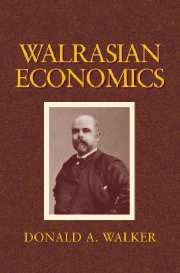Book contents
- Frontmatter
- Contents
- Preface
- Introduction
- Part I Walras's ideas
- 1 General philosophy and methodology
- 2 Economic philosophy and methodology
- 3 Methods of evaluation of economic theory
- 4 Human nature
- 5 Basic sub-models
- 6 Rationale for the written pledges sketch and its characteristics
- 7 Some bibliographical remarks
- 8 The definitive bibliography of the writings of Léon Walras
- Part II Walras's influence
- References
- References and Bibliography for Chapter 11
- Index
1 - General philosophy and methodology
Published online by Cambridge University Press: 02 September 2009
- Frontmatter
- Contents
- Preface
- Introduction
- Part I Walras's ideas
- 1 General philosophy and methodology
- 2 Economic philosophy and methodology
- 3 Methods of evaluation of economic theory
- 4 Human nature
- 5 Basic sub-models
- 6 Rationale for the written pledges sketch and its characteristics
- 7 Some bibliographical remarks
- 8 The definitive bibliography of the writings of Léon Walras
- Part II Walras's influence
- References
- References and Bibliography for Chapter 11
- Index
Summary
Introduction
There was a rationalist side to Walras's philosophical and methodological thought and, in a certain sense and in certain limited respects, an idealist side, but he was also a realist and an empiricist. He had the latter attributes in the sense that he contended, first, that there is an objective reality independent of ideas about it – there is the personal reality and there is “la réalité impersonnelle” (82, 1868, columns 210, 214, in 194, 1896, pp. 109, 119), “the reality of physical phenomena” (79, 1867, column 185, in ibid., p. 89); second, that concepts should reflect reality, and that theories regarding all aspects of experience that are amenable to scientific thought should be grounded firmly on empirical knowledge; and third, that both the assumptions and the conclusions of theories should be compared with reality and rejected or modified in the light of new empirical evidence. In Chapters 2 and 3 it will be shown that Walras made those contentions regarding the special case of economic science and the even more special case of his mature comprehensive model of general equilibration and equilibrium. It should be emphasized that Chapters 1, 2, and 3 are expositions of Walras's views. They do not judge them. They do not consider whether he was right or wrong in holding his views, nor whether he or other nineteenth-century scholars' opinions on scientific method accurately reflected how science is done or should be done, nor whether his terminology regarding “realism” or “empirical knowledge” or other philosophical and methodological matters was consistent with modern usage or appropriate in the light of modern conceptions.
- Type
- Chapter
- Information
- Walrasian Economics , pp. 23 - 57Publisher: Cambridge University PressPrint publication year: 2006



